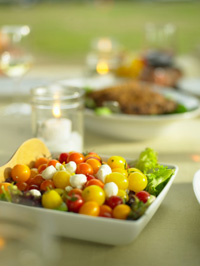If you need a stellar reference to preserving food that makes it easy to sleuth out your options, whether canning, freezing, dehydrating or digging a root cellar, grab The Beginner’s Guide to Preserving Food at Home: Easy Techniques for the Freshest Flavors in Jams, Jellies, Pickles, Relishes, Salsas, Sauces, and Frozen and Dried Fruits and […]
Category: Diet & cooking
7 Tips for Making the Transition to a Vegetarian Diet
Considering a vegetarian diet but don’t know where to start? Dietitian April Hamilton gives you the valuable transition tips she shares with her friends and clients.
10 Things I’ve Learned as a Vegetarian
Here are just a few things I’ve learned as a vegetarian: 1. Tofu has gotten an unfair bad rap. So have leafy greens. Actually, a lot of healthy foods are much better than the cynics would lead you to believe. Never tried kumquats or quinoa? Well, what are you waiting for?
How to Get the Protein You Need
It’s one of the most commonly asked questions of vegetarians: “But how do you get your protein?” Winston J. Craig answers—
and debunks some myths about protein while he’s at it.
Legumes and Their Effect on Heart Disease
At the beginning of the twentieth century heart disease in the public was a small problem; by the end of the century it had become the most frequent cause of death. Studies have shown a strong association between dietary saturated fat intake and the occurrence of this disease. The American diet provides an overabundance of saturated fat and cholesterol found primarily in animal products.
Thinking About Drinking Milk?
As scientific investigators have traced the causes of heart disease, cancer, arthritis, migraines, and digestive problems, the least likely suspect had to be milk. We poured it on our cereal, pushed it on our children, and couldn’t imagine it to be anything but healthful. But more and more researchers now view milk with skepticism about its benefits and concern about its risks. They are linking the epidemics of prostrate cancer, digestive problems, and other ills to our habitual consumption of specific foods including-and especially-milk.
Simple Creative Salads
Salads at home once meant iceberg lettuce topped with a few carrots and perhaps a tomato. A salad was just a bland diet food or a precursor to a meal. Not so today. With all the varieties of greens now available at the supermarket, it has never been easier to make a healthy and tasty salad.
To turn a plain-Jane salad into a spectacular dish, just pick a blend of greens and add your favorite ingredients. It’s that simple and the possibilities are infinite when it comes to the delicious and healthy salad creations you can make. So let these recipes inspire you to get creative in the kitchen and enjoy a great salad every day.
Water Works
Water provides true refreshment for the thirsty, but most people don’t know that it also plays a vital role in all bodily processes. Unfortunately, most people don’t drink enough water, perhaps because they don’t realize just how important it is. The fact is, not drinking enough water affects every aspect of your body, right out to your skin.
Drink Up!
 As a health-conscious individual, you take pride in maintaining your body at an optimal level. You work out, eat healthy low-fat diets, and even take supplements.
As a health-conscious individual, you take pride in maintaining your body at an optimal level. You work out, eat healthy low-fat diets, and even take supplements.
But are you overlooking perhaps the most basic of all health-enhancing substances–water?
Water’s pivotal role in life is reflected in the composition of the human body. Accounting for approximately 60 percent of the weight of an average person and nearly two thirds of our complete structure, water’s presence is pervasive throughout our system. Next to oxygen, water is the most essential element in our physiology. We can survive for weeks without food, but only days without water. Water comprises 80 percent of blood, 73 percent of the brain, 73 percent of muscle, and 22 percent of bone. Without ample reserves of this critical fluid many major body processes would be severely hindered.
Read more about Drink Up! …
Vegetarian Nutrition
What’s the safest way to shed excess pounds, avoid high cholesterol and heart disease, and even cut your risk for certain types of cancer? “With a vegetarian diet,” says author Neal Barnard, M.D. “It’s the most powerful prescription for health I can suggest.”
Although the average vegetarian is slimmer and healthier than the average meat-eater, says Dr. Barnard, there is still a good deal of skepticism that an entirely vegetarian diet can provide complete nutrition. After all, in 1928 presidential candidate Herbert Hoover rallied supporters by promising “a chicken in every pot.” The dream realized, Americans are more out of shape than ever, with obesity, diabetes, heart disease, and other diet-driven illnesses claiming many thousands of lives each year. So what if we traded those chickens for spaghetti marinara, veggie burgers, lentil soup, or even a bean burrito? Would we turn the tide on many chronic illnesses? Physicians and dietitians say yes.
Read more about Vegetarian Nutrition …




